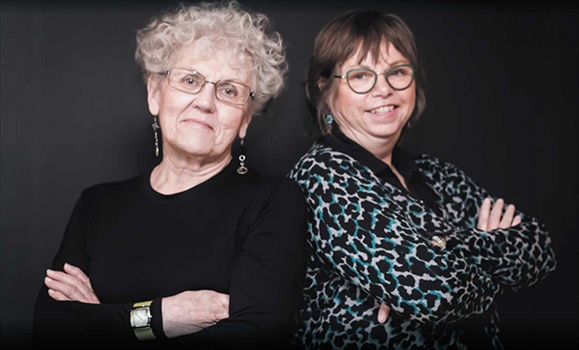News
» Go to news mainWomen Unsilenced: Nursing alumni publish book about violence committed against women and girls

CONTENT WARNING: This story includes mentions of extreme violence against women and sexual assault.
When retired nurses Jeanne Sarson (MEd, BScN '90) and Linda MacDonald (MEd, BN '76) approached publishers with their book , the reactions were always the sameâthe story was compelling, but no one wanted to publish it because the subject matter was harrowing. Undeterred, Sarson and MacDonald decided to self-publish.
The irony of having to âunsilenceâ themselves makes Sarson laugh. âWe are very open,â she explains. âWe are not going to expose torture without talking.â
There Women Unsilenced since it was launched in September 2021. Weaving together multiple perspectives, Sarson and MacDonald explore and expose the impact of violence committed against women and girls, societyâs failure to address these crimes, and the ways that our social, political, and justice systems effectively perpetuate revictimization. For those who have survived violence, the book is both validation and a resource for healing. For professionals such as educators, lawyers, health care workers, social workers, and human rights activists, it is an invaluable resource to help them address and break this cycle of violence. Sarson and MacDonald call it non-state torture (NST)âtorture committed by people such as parents, spouses, human traffickers, buyers and pimps in public and private places.
âWe have often been asked, âWhy do you insist on calling it non-state torture? Why don't you call it something else?ââ Sarson says. âBut torture is torture. You can't call it anything else.â
âNST has many forms, such as female genital mutilation, child forced marriage, widow burning, and witch hunting in Papua New Guinea,â MacDonald adds. âIt is a very broad term, but it basically involves people who are not employed by the state who torture for pleasure, power, and profit.â
Sarson and MacDonald have both experienced that abuse first-hand; both grew up in families with domestic violence. MacDonald says it was the biggest obstacle she ever had to overcome. âI talked about it often when I was young, but no one was listening or wanted to talk about it then. It wasnât until I met Jeanne that I could really start talking about the violence and how important it was to heal from it.â
Inspired by their conversations, Sarson and MacDonald started an independent nursing practice in Truro in 1993 to help for both other women and men who had experienced abuse. That same year, they met Sara (not her real name), a woman who shared her history of being beaten, raped, and rented out by her parents. âBy our third session with her, we realized that what we were hearing was not abuse; it was torture,â MacDonald says. âWe also realized she could not be the only person in Nova Scotia who has lived through this. We decided to raise awareness about these crimes and preventing them.â
In the years that followed, these ±«Óătv School of Nursing alumni drew on their training to conduct extensive research with women who had experienced torture, share messages of hope and healing, and call on the United Nations to recognize NST as a human rights crime that must be stopped. It has been, at times, a lonely, frightening, and frustrating journey. âI remember once saying to Linda, âWe might die with this story,ââ recalls Sarson. âI did not want others who revealed they had been subjected to torture to be silenced. The silence around this torture was such a struggle that it was important to break it. We committed to putting out as much literature as we could to help end that struggle for others. We are also thrilled to learn that our book has been ordered by the United Nations Library in Geneva.â
Sarson and MacDonaldâs book deepens that commitment. Their hope is that it will provide a foundation for readers to lobby for change, but they are quick to note that its publication is not the culmination of a 30-year journey; it is a midpoint in an ongoing quest. They want to see Canadaâs Criminal Code changed. They want to see the United Nations recognize NST as a human rights violation. And they want to be part of the effort to make these changes, and more, happen.
âI have never lost my optimism,â Sarson says. âOptimism comes with a sense of resilience. Iâve been resilient since I was a toddler when I realized that if I was going to survive, I had to take that on myself.â
MacDonald agrees, adding, âIf I pass my torch on, I might as well pass on myself because my torch is my lifeforce. I want to keep doing this so that women who have been through this are validated, they can take their perpetrators to the courts, and have the courts understand that this torture as a crime. Those are some of the goals that Jeanne and I have.â
Recent News
- Belief in leadership: New Kinesiology course offers lessons from Lasso
- Two Dal Health graduate students heading to the 3MT finals
- Breaking the cycle: Rethinking substance use, stigma, and social inequities in Canada
- Top 10 Dal Health stories of 2024
- Cards for care: Semester three nursing students collect $1,600 for MOSH
- Master of Health Administration grad continuing cancer research in PhD in Health program
- SWABâRx study aims to expand sexual health services in pharmacies
- Master of Science in Occupational Therapy grad passionate about sustainability in healthâcare
